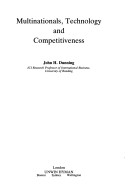This monograph explores some aspects of the interface between technology, competitiveness and the role of multinational enterprises (MNEs) in the modern world economy. It draws on a number of paradigms and theories based on two main streams of economic thought, and contends that the internationalization of production not only affects the competitiveness of the firms undertaking the production, but also that of other firms which are part of their sphere of influence or network of activities. Foremost among these are suppliers and competitors in both the home countries of the MNEs and the host countries in which their affiliates operate, but through such avenues as managerial and labour turnover, the spillover or multiplier effect is often much wider than this. It is seen that, both within industries and between industries, MNEs affect the way economic activity is organized, the pattern of that activity and its outcome - in short, the competitiveness of countries. The issue of the difference between the competitiveness of firms and that of countries is addressed.
Acccording to the author, MNEs judge their success by how well they perform relative to other firms, independently of where they produce their output, as many produce the majority of the value-added outside their national boundaries. Countries, however, judge success by the efficiency at which their own resources, or those which their firms may use abroad, can create value-added activities for their own citizens. The modern situation is compared with that of a century ago, and the differences and their economic causes are discussed.
- ISBN10 004445175X
- ISBN13 9780044451754
- Publish Date October 1988
- Publish Status Out of Print
- Out of Print 15 July 1993
- Publish Country GB
- Publisher Taylor & Francis Ltd
- Imprint Routledge
- Format Hardcover
- Pages 350
- Language English
